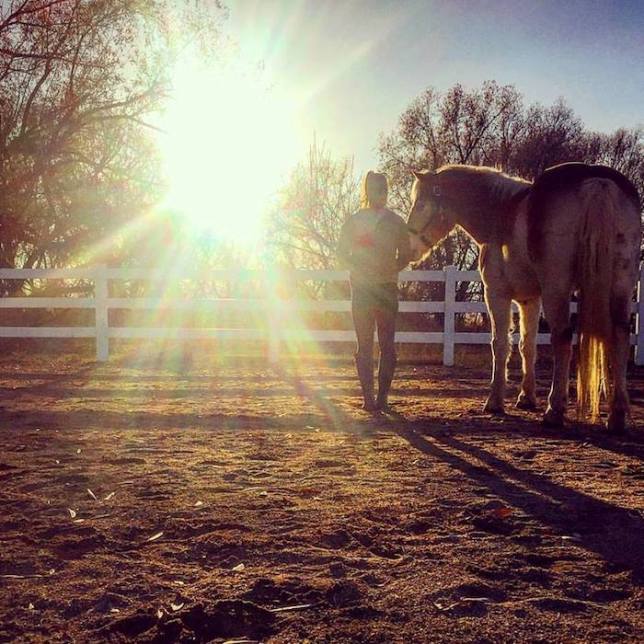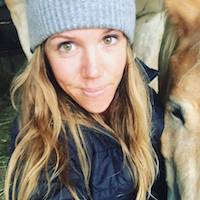
It’s been five years since I boarded a bus with a duffle bag in one hand and my passport in the other, looking over my shoulder as the West Bank faded from sight and Egypt came in to view.
I spent three days by the Red Sea trying to piece myself back together before I realized I truly needed help.
Depression had been a longstanding struggle for me, but my work in conflict zones put an added strain on my already fractured heart. I collected stories of human rights violations and folded them into my notebook—one splintered life at a time—and the weight of it all eventually snapped my heart in two.
Sitting in the middle of the Sinai, I wanted the mountains I had grown up with—and now, (five years later) I am still here, watching the Flatirons and the red-winged blackbirds. I’ve carved out a place for myself at an equine-assisted psychotherapy facility. But the old memories stick to my ribs and my throat. They press against my chest. I’m still here, exploring old roads and the contents of my heart on the back of my favorite horse.
I chose a different life than the one I had imagined. I thought I would be living out of a suitcase, but now I see how I was only trying to stay one step ahead of the depression I couldn’t run fast enough from. I needed to stay put long enough to manage it.
So, when I came to Colorado, I forced myself to stay. “For a few years,” I said. “Just for a few years until I can understand the things I have seen and the way my heart has crumbled.” But it’s been almost five years, and I am still here. I have put my roots in so deep that when the winds of my restlessness rage, I remain.
My life is tied to this place and the 30 horses who inhabit it. To dawn feedings and mucking stalls; to the dust that curls into the air and settles into the creases of saddles and boots. It’s reflected in the green eyes of the barn cat who slips in and out of the shadows. It’s connected to the people and horses who arrive here, limping through their old wounds and trying so hard to be brave. I watch them come and go, learning to take deep breaths, to accept help, to trust, to manage the darker emotions that keep us running from ourselves.
But my eyes still see the horizon. Horses symbolize travel and freedom and connection—all of the things my heart craves—but learning what these horses have to teach me has required me to tie myself to a place I cannot leave. It has required a patience and vulnerability beyond anything I have ever known. It has required a willingness to wait, the humility to know when to step back, and the confidence to know when to push forward.
When I arrived in Colorado, I was on the losing side of a constant battle with depression and anxiety. I didn’t want to stay still. I wanted to outrun my pain and the memories that caused it, but I forced myself to stay, and I reached out to the only thing I knew had the power to make me stay—horses.
So now, I am here: working at an equine-assisted psychotherapy facility. I have acquired a stubborn horse and a rambunctious heeler puppy. I am trying as hard as I can to stay still, to take deep breaths, and lean into my anxiety. There are still days when I wonder if I chose wrong, if I should still be shifting quietly in the desert sand with all my possessions in a duffle bag. Brokenhearted, but free to roam.
Truth is, depression is a daily struggle. Some days I can hardly get out of bed, but the horses must be fed and the dog needs a walk. These animals are carefully leading me through the landscape of my own broken heart, helping me to pick my way through memories of soldiers and sadness, of civilians caught in the crossfire of political ambition and a radical ideology.
Horses are herd animals, hypersensitive to their environment and to the emotional state of those around them. Horses respond to how we feel rather than what we say. I spent so long pushing down my emotions, trying to forget everything I’d seen. The horses forced me to remember. They forced me to face what I fear most—that one day, my depression will win.
Over the past three years, my horse has carried me through every anxiety attack, standing quietly while I grab fistfuls of mane and cling to him until I can breathe again; he has pushed me harder than I thought possible.
He has shown me that love can take hard knocks and old memories—that when my pain brings me to my knees, there will always be someone willing to sit with me until I am ready to make it back to my feet. He has taught me that vulnerability is terrifying, but it is necessary for connection and connection is key to managing depression. He has forced me to tell him the things that I needed to tell myself—the things we don’t tell ourselves or one another often enough. “You can do this. We will work through this. It’s okay to be afraid. I will protect you. I will take care of you. Mistakes are allowed. Imperfection is okay. I forgive you. I admire your bravery, your strength, and your willingness to try.”
Our hearts know what they need, and mine has always told me: horses. My anxiety burns when I stand still—and there may be temporary relief in running away, but in training my horse to face his fears, I have had to come to terms with my own. In teaching him to counter his instinct to run away, I have had to learn to talk down my own instinct to run away.
I spent three years circling the perimeter of the Medicine Horse community, mucking stalls and sweeping mats, before I found the courage to look up and reach out. But I am learning to trust that my peace of mind is here, somewhere between all of this dirt, the sound of hooves striking farm roads, and rusted walls of this old dairy barn.
Healing is not easy. It takes commitment to a different kind of travel. For me, it took walking the same path between these old barns over and over again to make new hopeful things from old painful memories. Perhaps it could do you the same.
~
Relephant:
The Healing Power of Furry Friends.
Healing Hearts with Horses: Veterans & PTSD.
Author: Nikki Hodgson
Images: Author’s Own; Amazon
Editors: Danielle Beutell/Catherine Monkman
Copy editor: Yoli Ramazzina
Social Editor: Waylon Lewis







Read 17 comments and reply